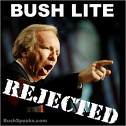OF COURSE, FIRST YOU HAVE TO ACTUALLY BE COMPETENT
Good, sensible advice that U.S. government leaders would do well to heed:
John Reid's task, as he comes up on airport television screens, is to reassure the milling masses of grounded holidaymakers that the state has a grip of the situation. This is as much about tone and body language as about the precise words he uses.
The terrorist wants to hear the crack of uncertainty in his voice, and see a hesitation look in his eye. Reid is a good choice for this role. He has a natural authority.
My advice to him now would be to rein back his natural - occasionally splendid - aggression and use the quiet power of his voice to convey a solid competence. And I would advise him against rhetoric. Make no sweeping statements about the war on terrorism, arcs of extremism, axes of evil. This is what terrorists want to hear. It gives them status as ideological warriors, rather than squalid would-be killers.
Leave that kind of talk to columnists. Use understatement and let the public draw its own conclusions. Don't labour the point that this plot - which has the feel of something genuine and very serious - underlines what you've been saying about the nature of the threat. It does. Let others say that for you.
The British public needs a sense that its political leaders, speaking for operational intelligence and police officers, are applying calm and wise judgement. This is the point of the home secretary leaving Cobra meetings to face the cameras.
The purpose of terrorism is literally to terrify the public, so that fear spreads beyond the immediate victims, or intended victims, to a point at which the population cannot go about daily life without dread. At that point, the terrorist would have created a general sense that events are slipping beyond the state's control, to the extent that it can no longer provide the security necessary for routine life to go on without crippling disruption.
This may sound apocalyptic, but the bombings at a disco in Bali and at the British consulate at Istanbul did serious economic damage by deterring tourism. The tourist trade is a worldwide soft target. If people no longer feel safe to travel, the terrorist would have achieved huge dislocation to ordinary life. And a spreading sense of dismay and hopelessness would give the terrorist a substantial achievement, even if loss of life is averted.
This plot is intended to strike terror into every family preparing to take children to the airport for the annual getaway, as the tube and bus bombings last year were intended to disrupt by frightening commuters. Charles Clarke did a solid job of reassurance a year ago, and now it falls to John Reid to ensure that people don't do what the terrorist wants by concluding that the only safe thing to do is stay at home.
Sadly, we now live in a world in which going out every day involves an unconscious calculation of risk, if you are going to pass through the kind of public place that terrorists might target. That calculation remains unconscious only if the state appears competent. This is the battle for the public mind which John Reid must now win. [emphasis mine]





